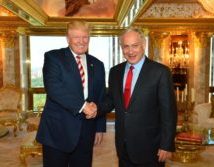
Will Trump get a peace deal done in the Middle East? U.S. Presidential Candidate Donald Trump (left) and Israeli Prime Minister Benjamin Netanyahu (right). Illustrative. Photo courtesy of Kobi Gideon (GPO)
It may have taken new United States President Donald Trump almost two months to call Palestinian President Mahmoud Abbas, but since Friday’s call Trump’s administration hasn’t wasted any time on moving towards a new Israel-Palestinian peace process. And based on the phone calls, Abbas seems to think this is moving forward as well. In the three days since Trump and Abbas spoke, the Palestinian Authority (PA) President to take time to speak again with Jordan King Abdullah to recap the Trump call and discuss the upcoming Arab summit—his second call in 24 hours with the Jordanian monarch according to the WAFA news agency—and also spoke with U.S. Consul General Donald Blome about “preparations for future contacts between PA and Trump administration,” according to a Tweet from journalist Khaled Abu Toameh.
Furthermore, a Palestinian spokesperson cited in a Ma’an News Agency report said Trump mentioned “re-launching the peace process” with Abbas. Maybe the activity is nothing more than busyness, but Trump sounded earnest according to a statement from the White House posted to the Consul General’s website recapping the call with Abbas. The statement said Trump “emphasized his personal belief that peace is possible and that the time has come to make a deal.” The call comes after Trump’s in-person meeting with Israeli Prime Minister Benjamin Netanyahu last month, during which the peace process was also discussed.
As if to put actions behind those words, The New York Times reported that Trump’s top negotiator Jason Greenblatt has plans to visit the sides as soon as this week. This comes after the Times noted that Trump had yet to even speak with Abbas since taking office in mid-January.
Now, another conversation in person is already in the works—the White House statement said Trump invited Abbas to meet in Washington “in the near future.” The Ma’an News Agecny report quoted Spokesperson for the Palestinian presidency Abu Rudeineh as saying Trump’s invite was to discuss “re-launching the peace process.”
Despite the renewed vigor in approaching a peace process that has been largely dormant for years, Trump “underscored” in his discussion with Abbas that “such a peace agreement must be negotiated directly between the two parties” and that the U.S. “cannot impose a solution on the Israelis and Palestinians, nor can one side impose an agreement on the other.”
Trump did say that the Americans would “work closely with Palestinian and Israeli leadership to make progress” towards a peace deal.” What was notably absent in the White House statement was any explicit reference to a Palestinian state. Trump made headlines after his meeting with Netanyahu last month when he said he could support a one-state solution if the sides agreed to such a plan.
Rudeineh, noted Ma’an, said Abbas told Trump he still backs a two-state approach, while Trump sounded more open to other suggestions in offering support to “any process that could lead to real peace between Palestinians and Israelis.”
(By Joshua Spurlock, www.themideastupdate.com, March 12, 2017)
